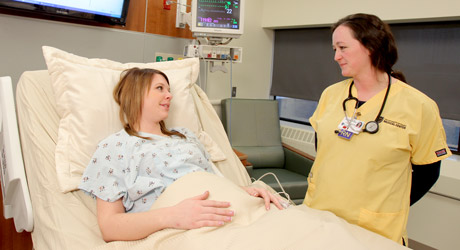Your Comfort
Addressing Pain
 Pain is an unpleasant feeling that tells you something is happening to your body.
After surgery, some procedures or tests may cause you to experience pain. Your input
is important. If your pain is not controlled, your hospital stay and recovery may
be longer. You, your doctors and your nurses are the pain management team, and you
are the most important member.
Pain is an unpleasant feeling that tells you something is happening to your body.
After surgery, some procedures or tests may cause you to experience pain. Your input
is important. If your pain is not controlled, your hospital stay and recovery may
be longer. You, your doctors and your nurses are the pain management team, and you
are the most important member.
- Address pain before a procedure.
- Ask questions regarding your surgery, procedure or tests that are scheduled to be performed. Understanding what’s going on may decrease your level of stress and anxiety.
- Ask about the types of pain management options available to you.
- Ask when and how often you can take pain medication and what the side effects are.
- Tell your doctor/nurse all medicines (including vitamins and herbal supplements) you are currently taking (bring a list).
- Tell your doctor/nurse about allergies (drug, food, etc.), sensitivities or other similar problems.
Describe your Pain:
- Location(s)
- How the pain feels to you: burning, stabbing, etc.
- What makes your pain worse: walking, lying in bed, etc.
- What relieves your pain: distraction, i.e. reading a book; using hot/cold compresses; etc.
- When your pain occurs: all the time, only in the morning, etc.
- How the pain has affected your daily activities: appetite, sleep, etc.
- Ask about the types of pain control available to you.
- Ask when and how often you can take pain medication and what the side effects are.
- Take your pain medicine as soon as the pain begins. The likelihood of dependency (addiction) to narcotic medications for acute pain while under the supervision of a physician is minimal.
- You will be asked to describe your pain before and after receiving pain medicine. Staff will use the pain scale of 0 to 10. A rating of 0 indicates the absence of pain and 10 represents the worst.
- Ask about alternatives to medicine that can help with your pain. Examples are: music, reading, meditation, lighting, etc.

Going Home:
- If you are still experiencing pain, check with your doctor for treatment options.
- If pain gets worse with activity, take your pain medicine before doing the activity.
- Tell the doctor if the medicine is not managing your pain.
